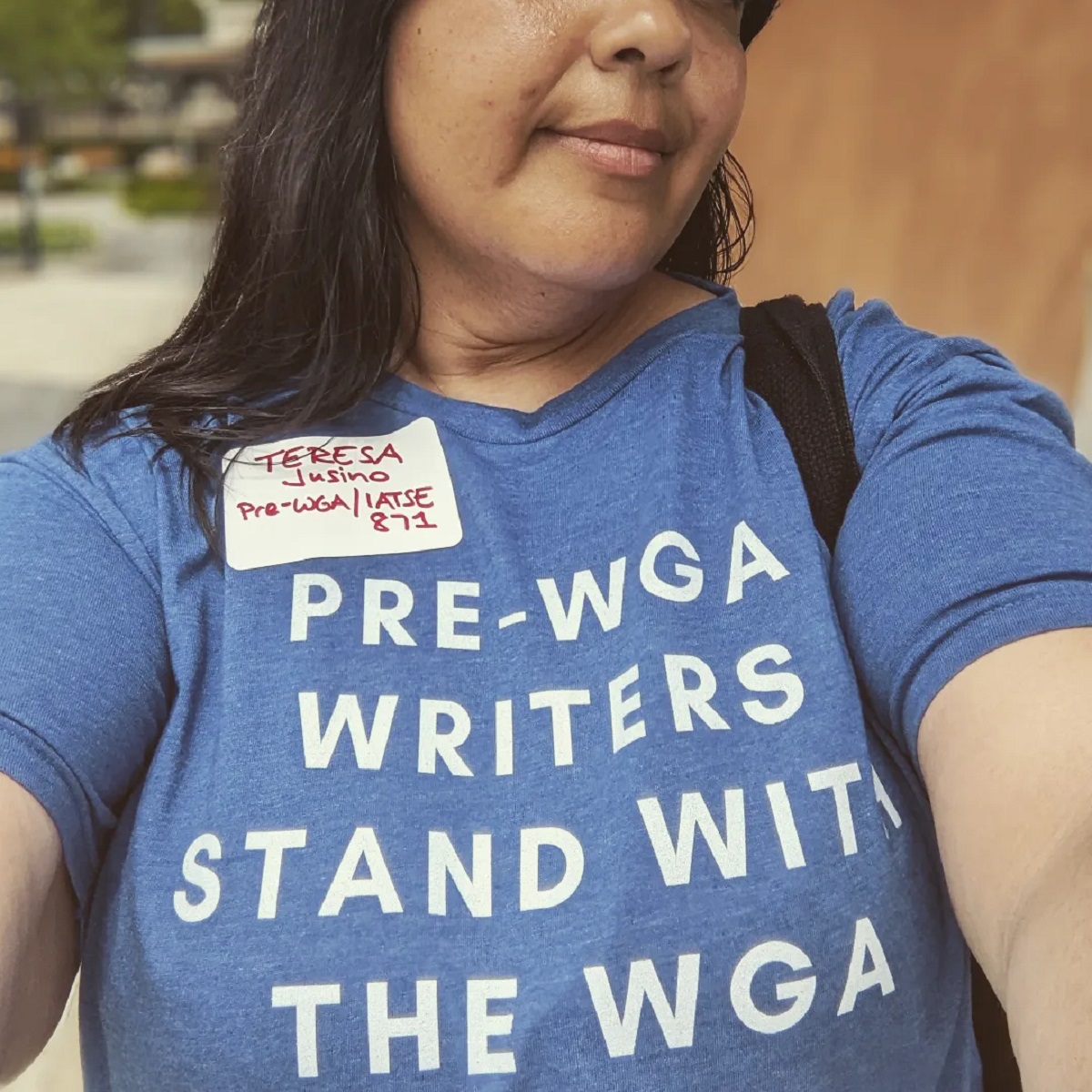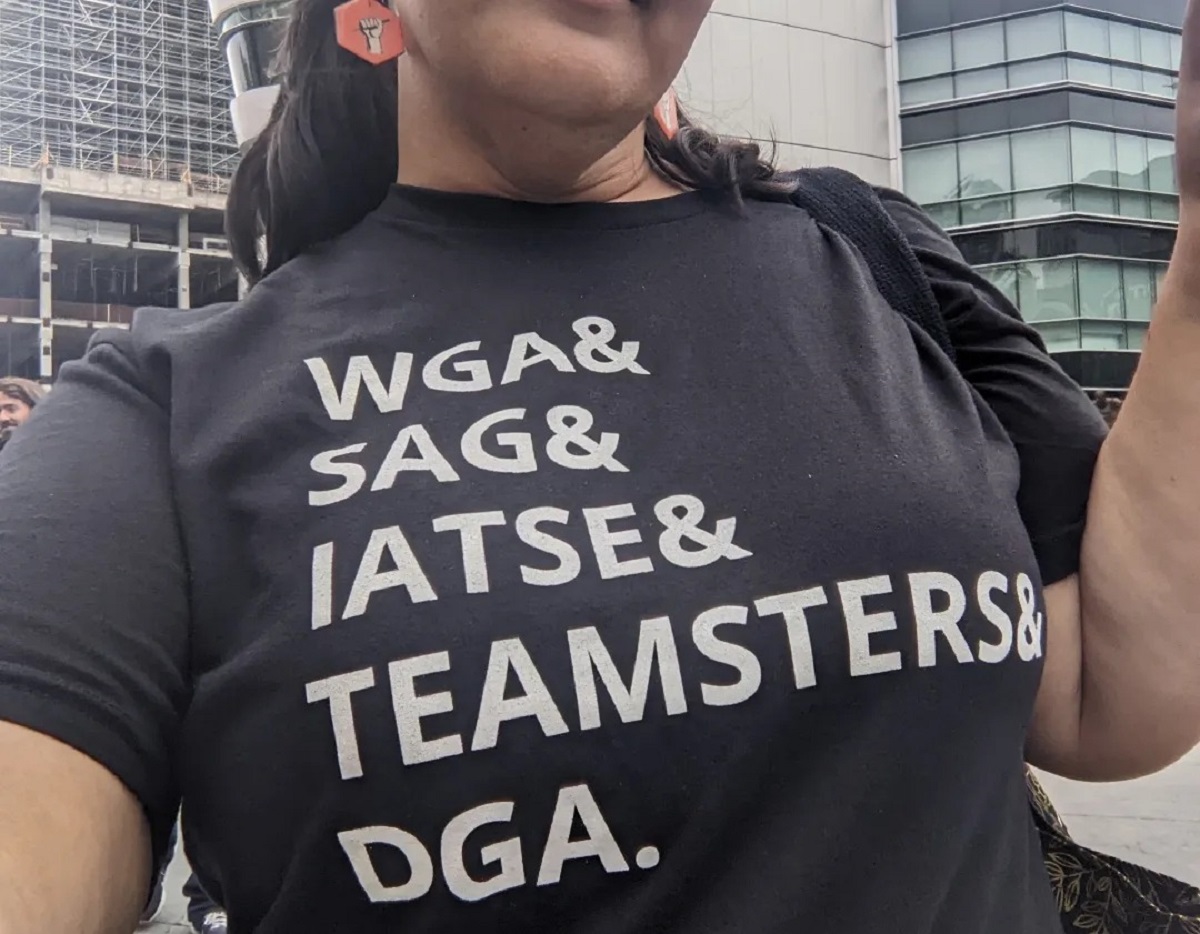It is amazing how corporations will bend over backwards, losing millions in the process, to continue abusing their workforce. The WGA writers’ strike is currently in Week 7. Yet, rather than the The Alliance of Motion Picture and Television Producers choosing to go back to the negotiating table to get back in business, their member companies have been trying to turn desperate people into scabs.
Important definitions and facts about strikes

What is a pre-WGA writer?
If you’ve been following the writers’ strike, you may have seen the term “pre-WGA.” What does it mean? Well, I’m a pre-WGA writer, hence my shirt in the above photo from a WGA picket line in L.A. last month. (I’m also a proud member of IATSE Local 871 for my production work.)
“Pre-WGA” isn’t an official term. It’s an informal way to refer to writers not yet qualified to be WGA members. Basically, anyone who wants to be a film/TV writer who aspires to WGA membership one day is “pre-WGA.”
What do pre-WGA writers have to do with the writers’ strike?
Pre-WGA writers like me are out on the picket lines fighting for the future of the industry they hope to join! It’s harder than ever to get and stay employed as a film/TV writer, because AMPTP member companies are hiring fewer writers in smaller writers’ rooms to protect profits. A lot of what the WGA is fighting for benefits pre-WGA writers, because it would lower many current barriers to entry. Things like minimum staffing requirements for TV writers’ rooms would codify hiring more writers at all levels.
However, since pre-WGA writers are newer to the industry—and any combination of young, broke, hopeful, and desperate—they’re vulnerable to predatory behavior from studios.

Strike rules and the writers’ strike
Just as you need to legally petition to become a union, once you’re a union member, there are rules about how strikes happen, how members comport themselves, and how “scabs” (those who, during a strike, do work that would normally go to a striking worker) are handled.
Scriptnotes, “a podcast about screenwriting and things that are interesting to screenwriters,” hosted by John August (a member of the WGA Negotiating Committee) and Craig Mazin (creator and co-showrunner of HBO’s The Last of Us), has been doing great, short explainers on the strike. In “Sidecast: One Week In,” August explained the purpose of the strike and the WGA strike rules to encourage supporters to act in the spirit of those rules.
The purpose of the strike is both to stop all current writing work in film and TV and not put any new work into the studio pipeline. For example, struck companies like Disney or Warner Bros. Discovery have annual writing fellowships, and in order to apply for them, writers send in original scripts in for consideration. If you are a pre-WGA writer, you’re not supposed to send any new material to a struck company until the strike is over.
While I’m pre-WGA, I do have a literary manager. The strike rules dictate that my manager cannot set up meetings with struck companies for me to discuss even the possibility of future employment until the strike is over, and I sent them the official email the WGA provided to officially ensure that my rep knows my stance.
The strike rules exist to force the AMPTP to understand how important the work of writers is by withholding it.
What happens if you break the writers’ strike rules?
If you’re a WGA member, you risk your membership. If you’re pre-WGA, and they discover you engaged in scab behavior after the strike started (if you submitted to a fellowship or had met about projects before the strike started, you’re fine as long as you stopped communicating about them after May 2), you risk not being admitted into the union at all.
If you’re in a union, the entire point is that you act collectively for the group’s benefit. If you don’t, they have the right to terminate your membership. If you’re not in the union, but prove that you’re not a good union member, it’s understandable that they wouldn’t want to admit you!
What about other unions?
The rules also affect other unions still working. Picket lines aren’t metaphorical; they’re physical. Two or more people must be present at a studio gate in order for it to be a picket, and the point is to discourage workers in other unions from going to work.
IATSE is the largest union representing crew members across many crafts and disciplines. They’re not currently on strike, so their members can work. However, according to their rules, they can’t be penalized for deciding not to cross another union’s picket lines, either. They can be temporarily replaced, but if the strike ends in a couple of days, and they’ve been replaced, they get their jobs back.
So, let’s say you’re a grip (lighting) on a TV set, and you’re told you need to report to work at 4:00AM. If you show up, and there are no people there picketing, there’s no “line” to cross, so nothing to stop you from going into the studio lot. Now let’s say you go off the lot for lunch a few hours later, and when you return there are picketers. You have the choice of either going back to work, or not crossing the line and going home. That’s entirely up to the individual, and you can’t be penalized either way.
IATSE members have been hugely supportive in not crossing picket lines, which is why so many productions have shut down!
Studio strike-breaking tactics to look out for
AMPTP member companies are working overtime to try to finagle their content from an increasingly unwilling workforce through shady means. Some examples:
If you’re a prose author or playwright who isn’t in the WGA, want to support fellow writers, and you get approached for opportunities in film or TV during the strike, please don’t take them! As I mentioned above, the goal of the strike is to starve the studio content pipeline. Wait until after the strike to pivot into screenwriting.
If you are a pre-WGA writer seeking representation, please know that 1) you might find representation, but they can’t really set you up on any meetings right now anyway, and 2) like it says above, no manager or agent gets paid unless you do. Ever. Period. Anyone who’s trying to charge you for their managerial services is a scam artist.
Don’t let them take advantage of your inexperience so they can make a quick buck during the writers’ strike while their WGA clients aren’t working.
Twitter users have said that Netflix has been reaching out to writers they rejected from their (already predatory) Writing Apprentice Program to set up meetings. Talk about desperate!
Rather than make a fair deal with experienced writers, companies like Netflix are trying to go around the WGA and prey on the desperation and hopefulness of new writers who might be desperate for work and see this as their opportunity to “break in.”
It isn’t. First, if this is how a company like Netflix employs you, it tells you they have zero interest in treating you well or paying you fairly.
Second, while there is work that one could do for Netflix that isn’t WGA work (like writing in animation, much of which is covered by a different union), the fact that the Netflix exec above mentioned “other roles that are top of mind” is a huge red flag.
If you take them up on their offers, you’re shooting yourself in the foot. When the strike is over, and the WGA does negotiate the fair deal they deserve, you won’t have any part of it, because they’ll see that you worked for Netflix during the strike and bar you from membership.
The WGA has access to various production call sheets through members of other unions showing solidarity, and they set up picket lines according to that information. So, productions like Daredevil: Born Again (which has since stopped production) and American Horror Story (still in production) are lying about their call times on call sheets to throw off the WGA, then contacting union workers privately with an earlier, “real” call time to get crew members in before a picket line can start so there’s “nothing” to cross. SHADY.
And apparently, producers have offered to fly a writer to another country to finish writing work, offering to pay them via Venmo so the WGA wouldn’t be able to track it! As the person texting above said, their writer friend didn’t take that offer, “but it’s so scummy.”
ALL THIS TO AVOID PAYING UNIONIZED LABORERS WHAT THEY DESERVE!
It’s clear how desperate AMPTP member companies are, which shows that the strike is working. Hold on, WGA! #Solidarity
(featured image: RapidEye/Getty Images)








